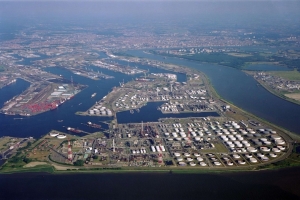


(Posted on 19/01/21)
The total throughput of Port of Antwerp in 2020 amounted to 231 million metric tonnes of cargo, a fall of 3.1% compared with the previous year. Thanks to the buoyant container throughput rates, which set a new record, the port was able to limit the overall decline in throughput. Compared with most other ports in the Hamburg-Le Havre range, the port held up very well despite a year dominated by coronavirus and other trade tensions. The investment in pioneering projects relating to energy transition, digitalisation, and mobility have also laid solid foundations for a sustainable future.
Though the throughput of coal was still growing in the first quarter, it came to a standstill afterwards. Fertilizers, ores, sand, and gravel also saw losses in 2020 while scrap just about held up, resulting in a 17% decrease in dry bulk throughput. This decrease is due to the growing supply of green energy and reduced demand for coal and ores from the steel sector.
Liquid bulk fell by a total of 4.2%. Crude oil throughput fell by 60% due to reduced refining activities. Meanwhile, the throughput of oil derivatives recovered with a growth of 3.4%, despite an initial reduction in demand due to the coronavirus crisis and the sharp drop in the price of oil. Chemicals also saw a fall in demand, which resulted in a drop of 8.9%.
Container throughput in the port of Antwerp has been breaking records for years now, and 2020 is no different. Despite a year dominated by coronavirus, with several difficult months and cancelled sailings, container throughput once again saw higher volumes since July. As a result, the 12 million TEU mark was exceeded for the first time in 2020, equating to growth of 1.3% compared with 2019. Thanks to this record in the container segment, the port held up better than most other ports in the Hamburg-Le Havre range in 2020.
Both coronavirus and the increasing protectionism as a result of global trade tensions had a markedly negative impact on breakbulk goods flows in 2020, resulting in a 16,3% decrease in total throughput compared with 2019. Steel, the main commodity group in this segment, was hit particularly hard.
In 2020, 13,655 seagoing vessels called at Antwerp, representing a 5.1% decrease compared with 2019. The gross tonnage of these vessels fell by 5.2% to 394 million.
In 2020, the port demonstrated its resilience even in difficult times. Despite the crisis, it made progress in terms of greener energy, digitalisation, and mobility through various pioneering projects. The business plan for the coming year continues to build on the 2018-2020 business plan with its three strategic priorities of sustainable growth, targeted transition, and resilience. As such, Port of Antwerp aims to continue playing a pioneering role in the future development of the port, in order to eventually become the global port that reconciles economy, people and climate.
Abu Dhabi based AD Ports Group, a global enabler of integrated trade, transport, industry, and logistics... Read more
This year marks a significant milestone in maritime innovation as Port Hedland, Australia, celebrates... Read more
Associated British Ports (ABP), the UK’s leading port operator, has announced the latest tranche... Read more
During the Investment, Labour, and Trade Promotion Programme in Japan (November 16–22, 2025),... Read more
AD Ports Group subsidiary Khalifa Economic Zones Abu Dhabi - KEZAD Group, the largest operator of integrated... Read more
Abu Dhabi based AD Ports Group, a global enabler of integrated trade, transport, industry, and logistics... Read more
Peel Ports Group has achieved a 48% reduction in operational greenhouse gas emissions in the last five... Read more
The Trois-Rivières Port Authority (TRPA) in Canada has announced the appointment of Mr. Anick... Read more
Euroports commitment to continuously improving operational efficiency, enhancing workplace safety, and... Read more
Under the slogan ‘Your Intermodal Link Between China, Iberia and the Atlantic Markets,’... Read more